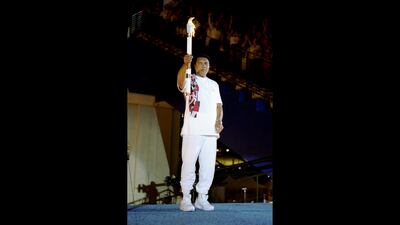Twenty five years ago to the day, boxing legend Muhammad Ali held the Olympic torch proudly in the air, signaling the start of the Atlanta Summer Games.

It is a moment that so many across the U.S. will never forget, especially Olympian Janet Evans.
A California native, Evans won almost everything there was to win in swimming, including five Olympic medals. To her though, the highlight of her career was passing the Olympic torch to Ali on July 19, 1996.
“It was [my] hands-down most favorite Olympic moment,” Evans tells 95.5 WSB in Atlanta. “And I tell people I’d give up every medal to do it again.”
She adds, “With Atlanta being my last Olympics, passing the torch to Ali and running that torch through the stadium was certainly my greatest lesson as an Olympian.”
The Olympic swimmer, who ended her career with seven world records, says it was an honor to play a small part in such a big moment for the Olympic Movement.
“To stand up there with Muhammad Ali…With his courage to say to the world, ‘yeah I’m sick, but I’m still here in the name of the Olympic Movement.’”
Ali lost his years-long battle with Parkinson’s disease in 2016.
Last year, the Olympic Cauldron was lit for the first time since the 1996 Olympics.
Georgia State University lit the iconic cauldron in celebration of the 2020 Tokyo Olympic U.S. Marathon Trials that took place in downtown Atlanta back in February 2020.
The cauldron sits just outside Georgia State Stadium at the intersection of Capitol Avenue and Fulton Street. Georgia State Stadium, previously Centennial Olympic Stadium before becoming Turner Field.
The stadium hosted the Opening and Closing Ceremonies of the 1996 Olympics, along with all of the track and field events.
Recalling more about the Atlanta Games, Evans tells WSB about witnessing the Centennial Olympic bombing firsthand. As a young athlete, Evans says that nothing prepared her for that experience.
“Being a kid that grew up in California, I thought for a second that it was an earthquake,” she says. “The building I was in shook.”
Evans adds, “I think you don’t think that something like that is going to happen at the Olympic Games. It was very tragic and very much a dark day in Atlanta.”
However, Evans says she and her fellow athletes refused to let the bombing define the rest of the Games:
“We said to the world, ‘the Olympics are more, the Olympics bring people together,’ and we weren’t going to let that ruin the spirit of the Olympics. And I think that the athletes did a great job honoring the victims, and honoring the spirit of the Games.”


